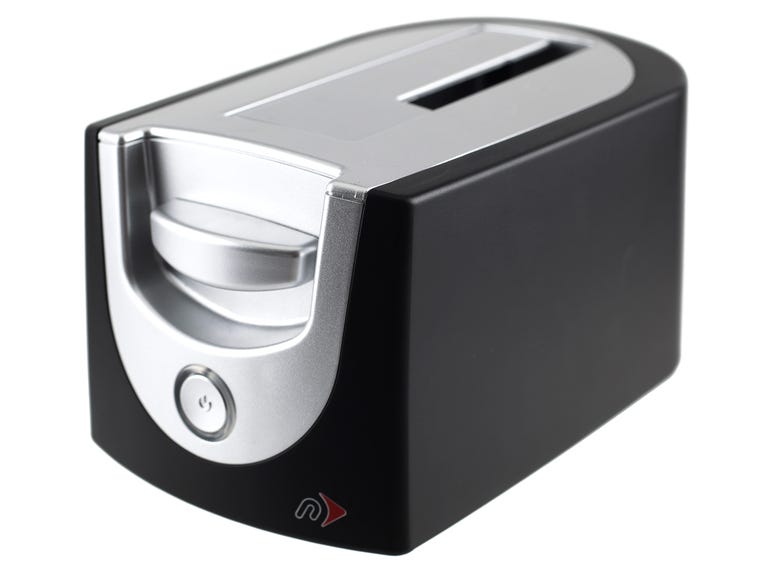Available from online retailers for less than $100, the Voyager Q makes a great addition to your desktop if you frequently work with various internal hard drives. The device supports both 2.5-inch and 3.5-inch SATA hard drives and is compatible with all the existing external storage connections. It's also simple to use, and in our testing, produced an impressive performance. Unfortunately, the Voyager Q doesn't support the older ATA (IDE) standard, which means that if you purchased your computer more than seven years ago, the Voyager Q will not be compatible. If this is the case, we recommend the WiebeTech UltraDock V4, which offers legacy support.
The Good
The Bad
The Bottom Line
| Drive type | External hard-drive docking station |
| Connector options | USB2.0, FireWire 400, FireWire 800 eSATA |
| Available capacities | Up to 2TB |
| Capacity of test unit | 500GB |
| Dimensions (WDH) | 3.9 x 5.9 x 3.2 inches |
| Notable design features | None |
| OSes supported | Windows 2K, XP, Vista, Mac OS X |
| Software included | None |
| Service and Support | 1-year warranty |
Design and features
The Voyager Q looks very much like a toaster, especially because of its top-loading slot, into which you load an internal hard drive. The slot, which can handle both the 2.5-inch and 3.5-inch SATA hard drives, has an opening with a spring-loaded latch that automatically secures the hard drive, regardless of its thickness.
On its front is a blue on/off button that doubles as its activity indicator and flashes red when the device is at work. Directly on top of the button is a release latch that ejects the hard drive when pressed.
On the back of the device is an array of connection ports, supporting USB 2.0, FireWire 400, FireWire 800, and eSATA connections. The Voyager ships with cables for each of these connections.
The only complaint we had with the Voyager Q's design is its power adapter, which, compared with the size of the Voyager, looks bulky.
With the Voyager Q connected to our test machine, we linked several hard drives without any problems. There was no software driver to install, and every hard drive we tried could be "hot-plugged," meaning we could remove or insert it while the computer was running.
Performance
We tested the Voyager Q with a 500GB high-speed Seagate hard drive, via all of its connections, and saw impressive scores. The device was consistently faster than most external hard drives we've reviewed.
The eSATA connection, for example, gave us 426.32Mbps for the read test and 340.32Mbps for the write test. For comparison the Seagate FreeAgent Xtreme, one of our fastest eSATA external hard drives, ran at 439.52Mbps for the write test and 336.82Mbps for the read test. These scores are about the same as those you get from internal hard drives. This means you could potentially install the operating system on the external hard drive without compromising its performance.
The Voyager also did very well with the other connections, except for the FireWire 800, which wasn't faster than the FireWire 400. However, we blame this on Windows XP, which we used for our test operation system, rather than on the Voyager because Windows XP has been known to not support the FireWire 800 connection very well. We suspect that performance on a Mac OS would be better.
(Longer bars indicate better performance)
| Write | Read |
Thanks to its fanless design, the Voyager Q also performed quietly and stayed cool during the testing process.
Service and support
We don't think you'll need much support for the Voyager Q, but NewerTech backs the device with a one-year warranty. Beyond that its support is rather scant. Its Web site offers just a PDF version of the manual and a Web form to e-mail its technical support. The tech-support phone number is also listed on the site; however, it's very hard to find and it's unclear about what hours it is available. If you want customer support, NewerTech will direct you to Other World Computing, which is a retailer that sells the product.



